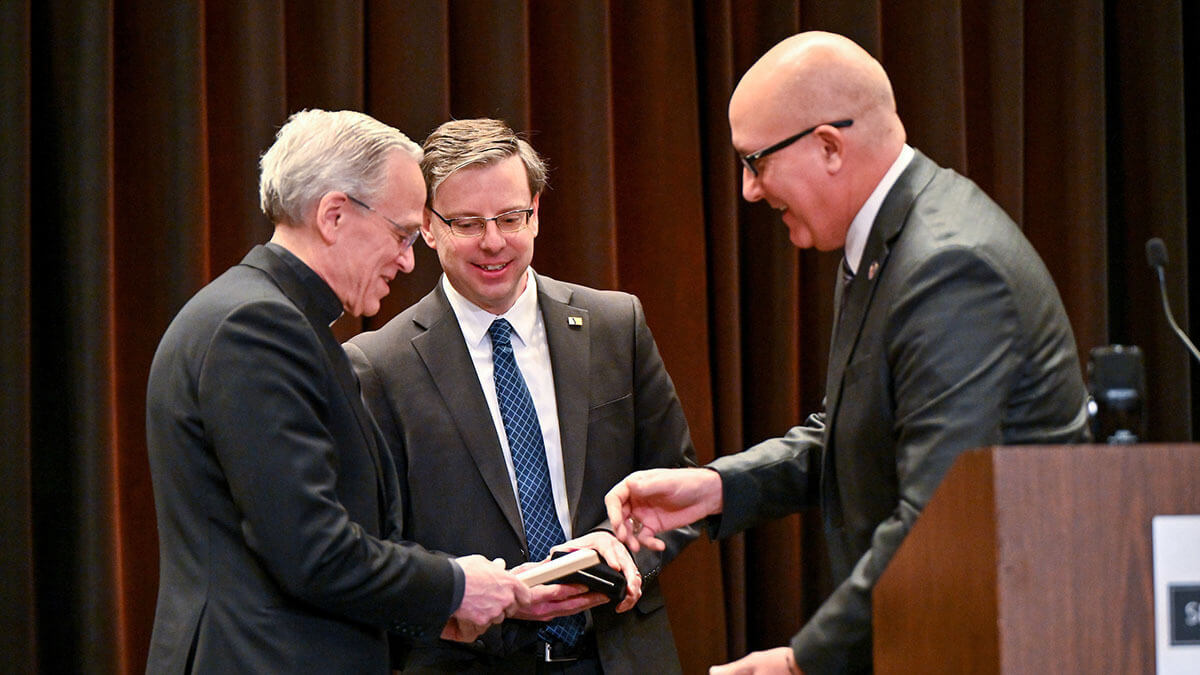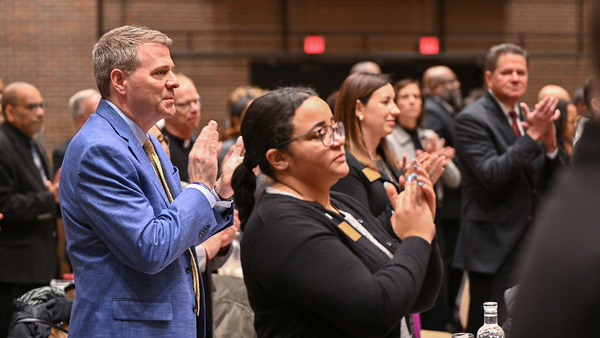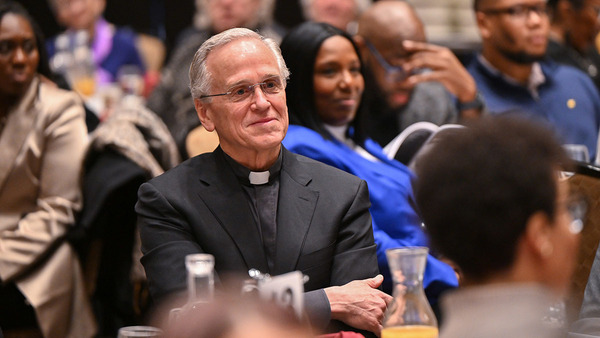Father Jenkins given keys to South Bend, Mishawaka at MLK Day event

University of Notre Dame President Rev. John I. Jenkins, C.S.C., was presented with keys to the cities of South Bend and Mishawaka during the annual Dr. Martin Luther King Jr. Community Service Recognition Breakfast on Monday in South Bend. Notre Dame was among the sponsors of the breakfast, which was organized by the Martin Luther King Jr. Foundation of St. Joseph County, Project Impact and South Bend Heritage Foundation.
Alongside organizer and advocate Gladys Muhammad, South Bend Mayor James Mueller, a 2004 Notre Dame graduate, presented the key to the city of South Bend to Father Jenkins in recognition of his dedication and commitment to the South Bend community.
“Under Father John’s visionary leadership, the University multiplied its economic impact to the greater South Bend region, growing into an international research powerhouse and a vital partner for our community,” Mueller said. “I thank him for his extensive accomplishments, as well as his friendship to me and to South Bend, and hope his next chapter is just as bright.”
Muhammad, who has worked closely with Notre Dame and Father Jenkins both as community organizer and in her previous role as associate director of South Bend Heritage Foundation, described the Nebraska-born Father Jenkins, himself a graduate of Notre Dame and a member of the University’s philosophy faculty since 1990, as “truly a citizen of South Bend.”

“The South Bend community recognizes Father Jenkins’ commitment and dedication to the South Bend community. He has been very instrumental in the development of our city, with special support given to the Northeast Neighborhood,” Muhammad said. “He has encouraged a culture of giving among Notre Dame students, demonstrated through their volunteer hours and raising of funds to support local nonprofit organizations. We also appreciate his consistent presence at community events like the MLK Breakfast.”
Muhammad also thanked Father Jenkins for his commitment to diversity as president, particularly in the areas of the visual and performing arts and athletics.
In September, Tennessee State University became the first Historically Black College or University to face Notre Dame at Notre Dame Stadium, with events surrounding the football game aimed at celebrating the history and legacy of HBCUs. Several of the University’s highest-profile athletics programs, including football, men’s and women’s basketball and women’s volleyball, are led by Black coaches. The University received the NCAA and Minority Opportunities Athletic Association Award for Diversity and Inclusion during the recent NCAA Convention. The award recognizes the initiatives, policies and practices of schools and conference offices that embrace diversity and inclusion across intercollegiate athletics.
On the arts side, venues such as the DeBartolo Performing Arts Center and Raclin Murphy Museum of Art frequently host diverse artists and exhibitions.
Mishawaka Mayor Dave Wood presented Father Jenkins with the key to the city of Mishawaka, thanking him for bringing South Bend, Mishawaka and the entire region together.
“Father John, the University of Notre Dame is known worldwide as an international powerhouse — you and your students are literally changing the world. And sometimes, in doing so, it’s easy to forget your backyard,” Wood said. “But you were a champion of our region, making sure that that never happened. And in fact, our region has come together under your leadership far more than it ever had in the past. And I want to recognize and, on behalf of our residents, thank you for that. We are headed in a great direction as a city and a region, and that is in large part because of you.”
“I will treasure these recognitions. But most of all, I will treasure all of you and the friendships we’ve made and the time we’ve had together. God bless you. Thank you.”
“I will treasure these recognitions. But most of all, I will treasure all of you and the friendships we’ve made and the time we’ve had together. God bless you. Thank you.”
Under Father Jenkins’ leadership, the University has, among other initiatives, taken concrete steps to attract and retain more diverse students, faculty and staff; promoted a “speak up” culture around issues of diversity, equity and inclusion (DEI); incorporated DEI as a key priority in its strategic planning process; initiated an inclusive campus survey; appointed a vice president for institutional transformation charged with creating and coordinating an integrated approach to DEI; and opened a new Center for Diversity, Equity and Inclusion in LaFortune Student Center to foster a welcoming and inclusive environment for students.
Additionally, in the wake of the killing of George Floyd in 2020, Father Jenkins and the University’s Board of Trustees identified the need to develop a DEI strategic plan to ensure sustained and lasting progress, leading to a special Board of Trustees Task Force Report on Diversity, Equity and Inclusion in 2021. Among other things, the report calls on the University to increase representation and strengthen a culture of inclusion and belonging on campus.
After 19 years of service, Father Jenkins will step down as president of Notre Dame and return to teaching, writing and ministry at the University at the end of the academic year, he announced in October. Rev. Robert Dowd, C.S.C., has been elected to succeed him.
Since being elected president in 2005, Father Jenkins has prioritized community and economic development and engagement as keys to the University’s short- and long-term success. Under his leadership, the University has collaborated with a variety of public, private and nonprofit organizations to improve life for everyone in the region, with a particular focus on projects and initiatives aimed at increasing access to education, housing, health care and other services and resources for historically marginalized members of the community.

Notably, the University has invested heavily in off-campus residential and commercial development (Eddy Street Commons, Triangle Neighborhood, Notre Dame Avenue Housing Program), business and workforce development (IDEA Center, LIFT Network, iNDustry Labs), adult and K-12 education (Robinson Community Learning Center, TutorND), research (Notre Dame Turbomachinery Facility, Center for Civic Innovation), and the arts (Raclin Murphy Museum of Art, O’Neill Hall of Music and Sacred Music, Arts Gateway).
The University has also been an integral member of the South Bend-Elkhart Regional Partnership, helping to secure nearly $100 million in state funding for transformative economic and community development projects in Elkhart, Marshall and St. Joseph counties.
Recently, the University announced two significant investments in downtown South Bend: acquisition of the vacant former South Bend Tribune building and a gift from the Veldman family to significantly expand the quality and availability of mental health care in the community via a new psychology clinic along Hill Street.
The University recently adopted a new University-wide strategic framework, the first to include the words “South Bend, Indiana”, noting, “It is now clearer than ever before that for Notre Dame to thrive, the South Bend region must also prosper. And a more prosperous South Bend strengthens Notre Dame.”
Accepting the keys to the cities, Father Jenkins expressed his deep affection for the entire community.
“I love this community; I love the people in this room,” he said. “I believe in this community and I believe in its future. If we can work together, this great community can be even greater. It’s been my privilege to be president of Notre Dame and to work with the wonderful people in this room to make this a better community. I believe its best days are ahead if we can work together to make this community everything it’s called to be.”
He concluded, “I will treasure these recognitions. But most of all, I will treasure all of you and the friendships we’ve made and the time we’ve had together. God bless you. Thank you.”
Latest University News
- Alumni Association set to hold second annual Notre Dame Global Day of ServiceThis Saturday (April 27) the Notre Dame Alumni Association will host the second annual Notre Dame Global Day of Service — a day to mobilize the Notre Dame spirit of service and serve those most in need in communities around the world.
- Alumni Association presents annual spring awardsThe University of Notre Dame Alumni Association recognized a number of distinguished alumni and staff during its annual spring board meeting. The association presents awards throughout the year that fall into six broad categories, each representing an area in which the University encourages excellence: the arts, athletics, service to the Alumni Association, service to country, service to humanity and service to the University.
- Nobel laureate Joseph Stiglitz addresses inequality with a people-centered economyInequality is a policy choice — not an inevitable outcome — and can be addressed through economic approaches that prioritize human dignity, economist and Nobel laureate Joseph E. Stiglitz said during a recent visit to the University of Notre Dame’s Keough School of Global Affairs.
- Literacy scholar Ernest Morrell elected to American Academy of Arts and SciencesErnest Morrell, the Coyle Professor of Literacy Education at the University of Notre Dame, has been elected to the American Academy of Arts and Sciences, one of the nation’s oldest learned societies and independent policy research centers. Morrell was one of the 250 members of the newest AAAS class announced today. Other notable names among the group include filmmaker George Clooney, Apple CEO Tim Cook, novelist Jhumpa Lahiri, and Pulitzer Prize-winning New York Times columnist and 1993 Notre Dame alumnus Carlos Lozada.
- European Commissioner Mairead McGuinness to deliver 2024 Barrett Family LectureNotre Dame’s Nanovic Institute for European Studies will welcome European Commissioner Mairead McGuinness to deliver the fourth Barrett Family Lecture on Friday (April 26) at Iveagh House in Dublin. Her lecture, titled “Ireland, the EU and the USA: Navigating the Future Together,” will begin at noon local time.
- Medicinal chemist Sabine Hadida to deliver Graduate School Commencement addressThe University of Notre Dame Graduate School will hold its annual commencement ceremony at 9 a.m. May 18 (Saturday) at Notre Dame Stadium. Sabine Hadida, a renowned medicinal chemist, will deliver the keynote address. University President Rev. John I. Jenkins, C.S.C., will confer the various master’s and doctoral degrees.













